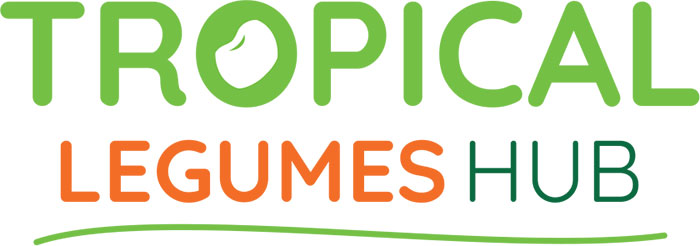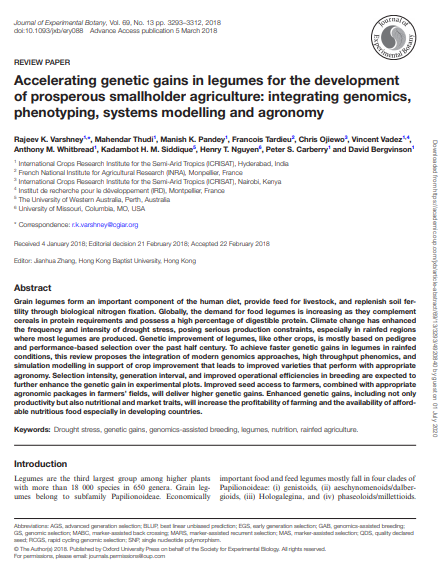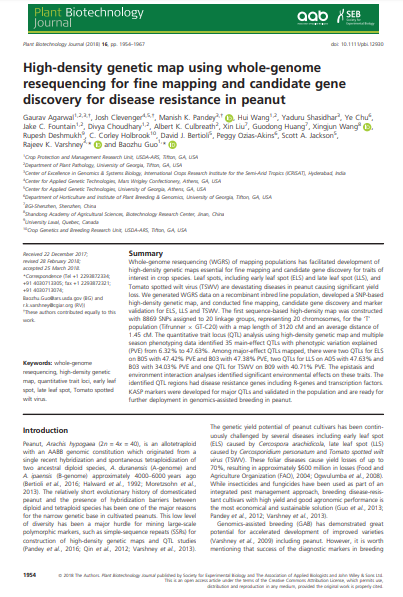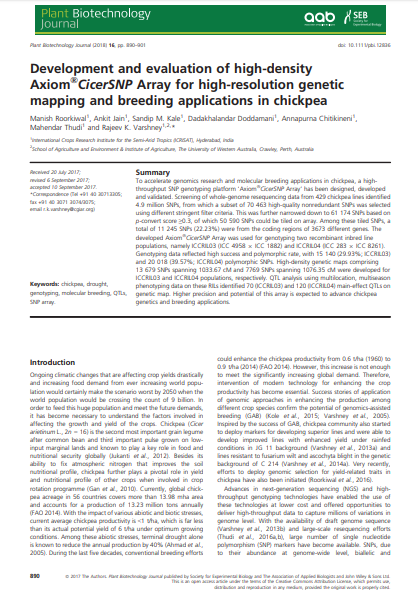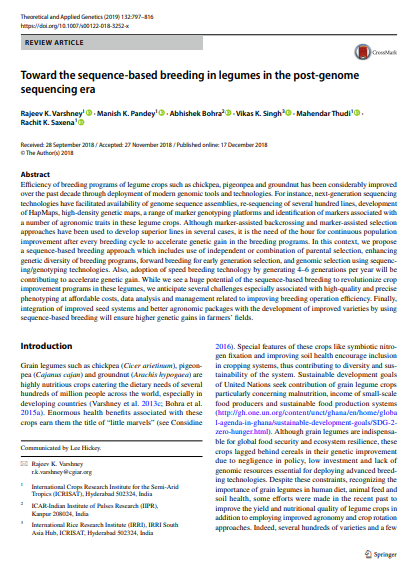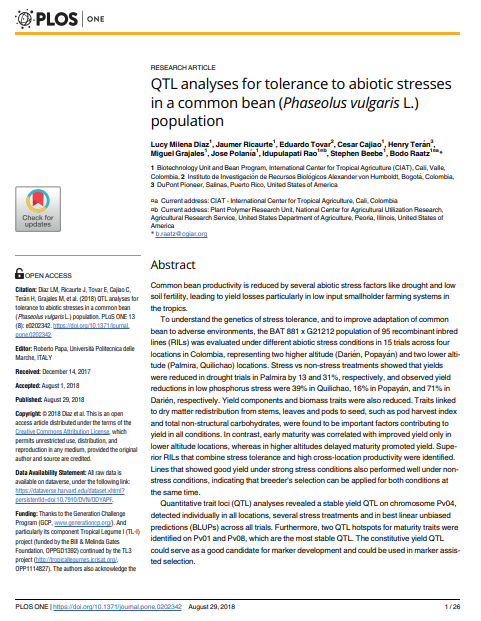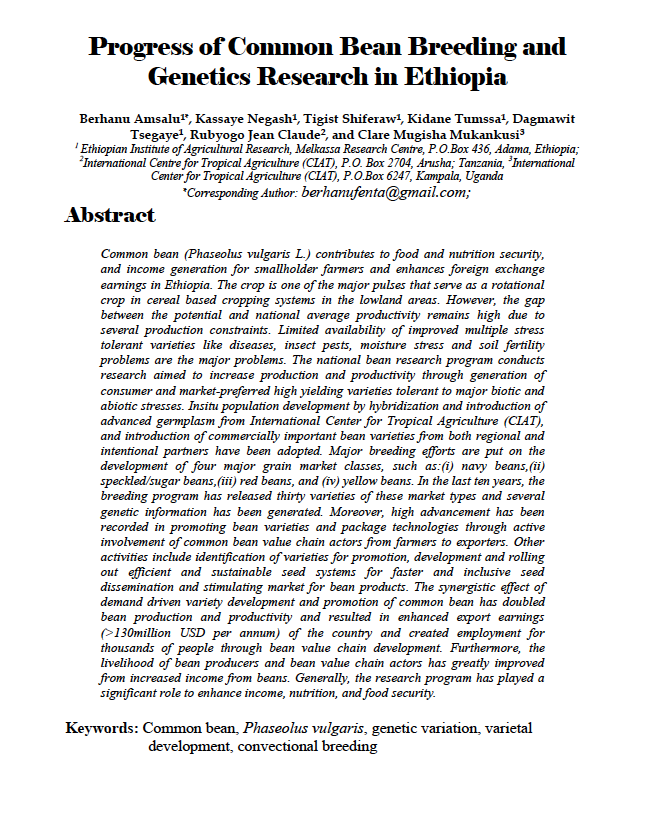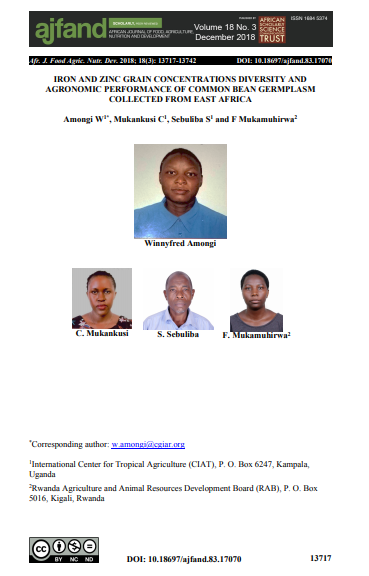Capturing genetic variability and selection of traits for heat tolerance in a chickpea recombinant inbred line (RIL) population under field conditions
To assess the genetic variability and identify heat responsive traits in chickpea, a set of 296 F8–9 recombinant inbred lines (RILs) of the cross ICC 4567 (heat sensitive) × ICC 15614 (heat tolerant) was evaluated under field conditions at ICRISAT, Patancheru, India.
Project: TLIII
File type: PDF
Accelerating genetic gains in legumes for the development of prosperous smallholder agriculture: integrating genomics, phenotyping, systems modelling and agronomy
To achieve faster genetic gains in legumes in rainfed conditions, this review proposes the integration of modern genomics approaches, high throughput phenomics, and simulation modelling to support crop improvement that leads to improved varieties that perform with the appropriate agronomy.
Project: TLIII
File type: PDF (1.04 MB)
High-density genetic map using whole-genome resequencing for fine mapping and candidate gene discovery for disease resistance in peanut
This paper evaluates efforts to generate whole-genome resequencing data on a recombinant inbred line population, develop a SNP‐based high‐density genetic map, and conduct fine mapping, candidate gene discovery and marker validation for early leaf spot, late leaf spot, and Tomato spotted wilt virus in peanut.
Project: TLIII
File type: PDF (1.03 MB)
Development and evaluation of high-density SNP array (Axiom®CicerSNP Array) for high resolution genetic mapping and breeding applications in chickpea
Screening of whole-genome resequencing data from 429 chickpea lines using the high throughput SNP genotyping platform ‘Axiom® CicerSNP Array’ identified 4.9 million SNPs, from which a subset of 70,463 high-quality nonredundant SNPs was selected using different stringent filter criteria.
Project: TLIII
File type: PDF (922.47 KB)
Pigeonpea improvement: An amalgam of breeding and genomic research
This paper emphasizes the ongoing genetic improvement in pigeonpea with an amalgam of conventional breeding as well as genomic research.
Project: TLIII
File type: PDF (436.04 KB)
Toward the sequence-based breeding in legumes in the post-genome sequencing era
This this article, the authors propose a sequence-based breeding approach which includes use of independent or combination of parental selection, enhancing genetic diversity of breeding programs, forward breeding for early generation selection, and genomic selection using sequencing/genotyping technologies.
Project: TLIII
File type: PDF (2.23 MB)
Genetic imprints of domestication for disease resistance, oil quality, and yield component traits in groundnut
This article analyses how the difference in ploidy between the wild groundnut species, Arachis, and cultivated genotypes hinder the transfer of useful alleles for agronomically important traits.
Project: TLIII
File type: PDF
QTL analyses for tolerance to abiotic stresses in a common bean (Phaseolus vulgaris L.) population
This study seeks to understand the genetics of stress tolerance, and to improve adaptation of common bean to adverse environments, by evaluating 95 recombinant inbred lines (RILs) under different abiotic stress conditions in 15 trials across four locations in Colombia.
Project: TLIII
File type: PDF (4.45 MB)
Progress of Common Bean Breeding and Genetics Research in Ethiopia
This review charts the progress of common bean breeding and genetics research in Ethiopia over the last decade.
Project: TLIII
File type: PDF (569.44 KB)
Iron and zinc grain concentrations diversity and agronomic performance of common bean germplasm collected from East Africa
This study evaluated 304 common bean lines sourced from the International Centre for Tropical Agriculture (CIAT) and its partners through the Pan Africa Bean Research Alliance (PABRA) for agronomic traits, disease response, yield, FESEED, and ZNSEED.
Project: TLIII
File type: PDF (1.42 MB)
